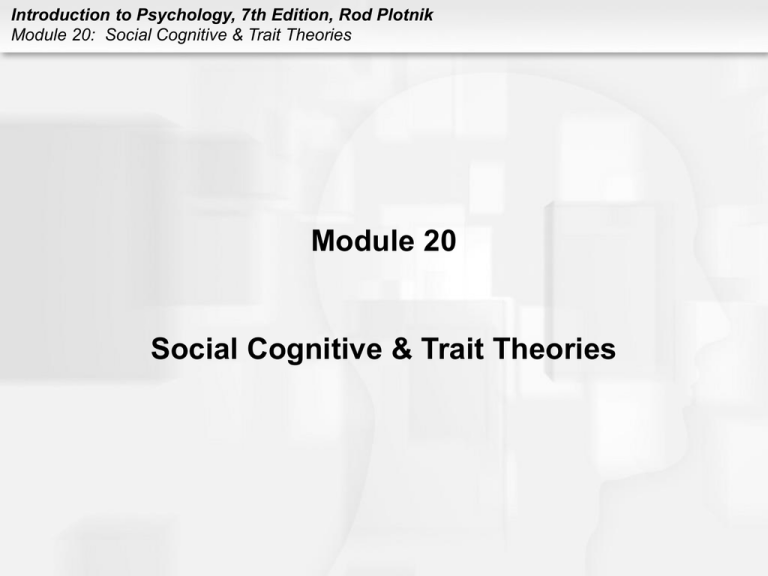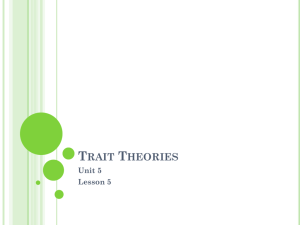Module 3
advertisement

Introduction to Psychology, 7th Edition, Rod Plotnik Module 20: Social Cognitive & Trait Theories Module 20 Social Cognitive & Trait Theories Introduction to Psychology, 7th Edition, Rod Plotnik Module 20: Social Cognitive & Trait Theories SOCIAL COGNITIVE THEORY • Definition – Says that personality development is shaped primarily by three forces: • environmental conditions (learning) • cognitive-personal factors • behavior • all interact to influence how we evaluate, interpret, organize, and apply information Introduction to Psychology, 7th Edition, Rod Plotnik Module 20: Social Cognitive & Trait Theories SOCIAL COGNITIVE THEORY (CONT.) • Interaction of three factors – Cognitive-personal factors • cognitive factors • Include our beliefs, expectations, values, intentions, and social roles • personal factors • include our emotional makeup an our biological and genetic influences – Behaviors • include a variety of personal actions, such as the things we do and say Introduction to Psychology, 7th Edition, Rod Plotnik Module 20: Social Cognitive & Trait Theories SOCIAL COGNITIVE THEORY (CONT.) • Interaction of three factors – Environmental factors • include our social, political, and cultural influences, as well as our particular learning experiences Introduction to Psychology, 7th Edition, Rod Plotnik Module 20: Social Cognitive & Trait Theories SOCIAL COGNITIVE THEORY (CONT.) • Bandura’s social cognitive theory – assumes that personality development, growth, and change are influenced by four distinctively human cognitive processes: – highly developed language ability – observational learning – purposeful behavior – self analysis – Bandura: much of human personality and behavior is shaped by our own thoughts and beliefs Introduction to Psychology, 7th Edition, Rod Plotnik Module 20: Social Cognitive & Trait Theories SOCIAL COGNITIVE THEORY (CONT.) • Four cognitive factors 1. Language ability • powerful tool for processing and understanding information that influences personality development 2. Observational learning • we observe parents, brothers, sisters, peers, friends, and teachers • we learn a great deal Introduction to Psychology, 7th Edition, Rod Plotnik Module 20: Social Cognitive & Trait Theories SOCIAL COGNITIVE THEORY (CONT.) • Four cognitive factors 3. Purposeful behavior • capacity to anticipate events, plan ahead, and set goals influences our personality development, growth, and change 4. Self-analysis • internal process • allows us to monitor our own thoughts and actions • deciding to change our goals or values, we can significantly affect our personality development Introduction to Psychology, 7th Edition, Rod Plotnik Module 20: Social Cognitive & Trait Theories SOCIAL COGNITIVE THEORY (CONT.) • Locus of control – refers to our beliefs about how much control we have over situations or rewards – Internal locus of control • believe that we have control over situations and rewards – External locus of control • believe that we do not have control over situations and rewards and that events outside ourselves (fate) determine what happens Introduction to Psychology, 7th Edition, Rod Plotnik Module 20: Social Cognitive & Trait Theories SOCIAL COGNITIVE THEORY (CONT.) • Delay of gratification – refers to not taking an immediate but less desirable reward and instead waiting and using an object or completing a task that promises a better reward in the future • Self-efficacy – refers to the confidence in your ability to organize and execute a given course of action to solve a problem or accomplish a task – use previous experiences – compare – listen – use feedback Introduction to Psychology, 7th Edition, Rod Plotnik Module 20: Social Cognitive & Trait Theories TRAIT THEORY • Definition – an approach for analyzing the structure of personality by measuring, identifying, and classifying similarities and differences in personality characteristics or traits – Trait • relatively stable and enduring tendency to behave in a particular way • Gordon Allport • found 18,000 terms; out of these 4,500 were considered to fit definition of personality traits Introduction to Psychology, 7th Edition, Rod Plotnik Module 20: Social Cognitive & Trait Theories TRAIT THEORY (CONT.) • Raymond Cattell – took Allport’s list of 4,500 traits and used factor analysis to reduce the list to the most basic traits – factor analysis • complicated statistical method that finds relationships among different or diverse items and allows them to be grouped together • 35 basic traits Cattell called source traits • describe all differences among personalities Introduction to Psychology, 7th Edition, Rod Plotnik Module 20: Social Cognitive & Trait Theories TRAIT THEORY (CONT.) • Finding traits: big five – Five factor model organizes personality traits and describes differences in personality using five categories • openness • conscientiousness • extraversion • agreeableness • neuroticism Introduction to Psychology, 7th Edition, Rod Plotnik Module 20: Social Cognitive & Trait Theories p463 BIG FIVE Introduction to Psychology, 7th Edition, Rod Plotnik Module 20: Social Cognitive & Trait Theories GENETIC INFLUENCES ON TRAITS • Behavioral genetics – study of how inherited or genetic factors influence and interact with psychological factors to shape our personality, intelligence, emotions, and motivation and also how we behave, adapt, and adjust to our environment • Studying genetic influences – Heritability • statistical measure that estimates how much of some cognitive, personality, or behavioral trait is influenced by genetic factors






